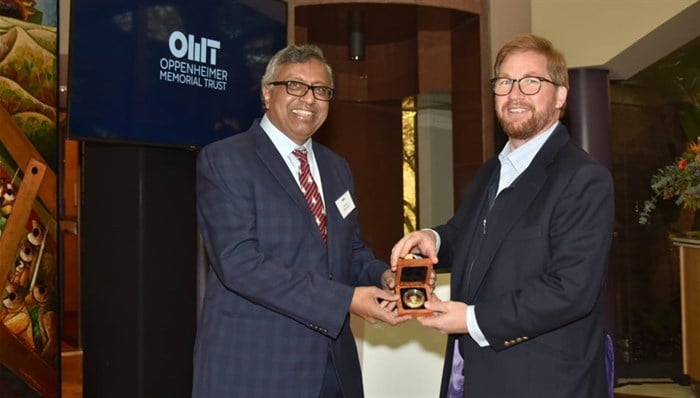South Africa takes a giant leap towards becoming a global leader in astronomy and astrophysics as Professor Sunil Maharaj of the University of KwaZulu-Natal (UKZN) receives the esteemed Annual Harry Oppenheimer Fellowship Award. The accolade recognises Professor Maharaj's exceptional work in the field of gravitational processes within evolving stars, a pivotal area bridging science, mathematics, and astronomy.

Professor Sunil Maharaj (left) has been honoured with the Annual Harry Oppenheimer Fellowship Award. Image supplied
Under the visionary partnership with the Square Kilometre Array (SKA), South Africa's strategic vision of advancing astrophysics is being realised through this project.
Reaching for the stars
Professor Maharaj's research explores the intricate workings of gravitational processes within stars, offering crucial insights into our understanding of the universe. This pursuit has been a fundamental scientific challenge since the early days of gravity research.
With a focus on collaborative efforts, this transformative project has brought together a dedicated team, not only from South Africa but also from Tanzania and India. Their collective expertise and contributions play an instrumental role in unravelling the mysteries of the cosmos. By fostering international collaboration, this initiative showcases the power of uniting diverse minds and resources towards a common goal.
“Professor Maharaj's achievement not only highlights the exceptional talent within South Africa but also underscores the nation's commitment to fostering scientific excellence and becoming a leader in the field of astrophysics. The collaborative nature of this project serves as a testament to the power of international cooperation and knowledge sharing”, said Jonathan Oppenheimer, chairman of the Trust.
One giant leap for South Africa
The award comes at a time when South Africa is making huge strides in the field of astronomy, as SKA, the world’s largest radio telescope, is currently being constructed by South Africa jointly with Australia. Professor Maharaj adds that although South Africa is still catching up to developed countries in astronomy, the SKA is to the advantage of the country.
The practical implications of this research extend far beyond the realm of theoretical physics. A deeper understanding of gravitational processes within evolving stars paves the way for technological advancements and potential applications in various fields. It opens new avenues for astronomical discoveries, space exploration, and the development of innovative technologies that can benefit South Africa and the global scientific community.
Upon winning the award, an elated Professor Maharaj said: “It has been a very humbling experience to be shortlisted for the award, and to actually receive it. It came as a surprise to me as I thought it would go to something more observational and practical like a product or a cure for Covid”.
The Harry Oppenheimer Fellowship Award is granted to scholars of the highest calibre who are engaged in cutting-edge and internationally significant work that has particular application to the advancement of knowledge, teaching, research and development in South Africa and beyond.
Professor Maharaj will be collaborating with leading experts in gravity theories and relative astrophysics, including Professor Megan Govender from Durban University of Technology and Professor Aroon Beesham from the Mangosuthu University of Technology, amongst others from South African universities.










































